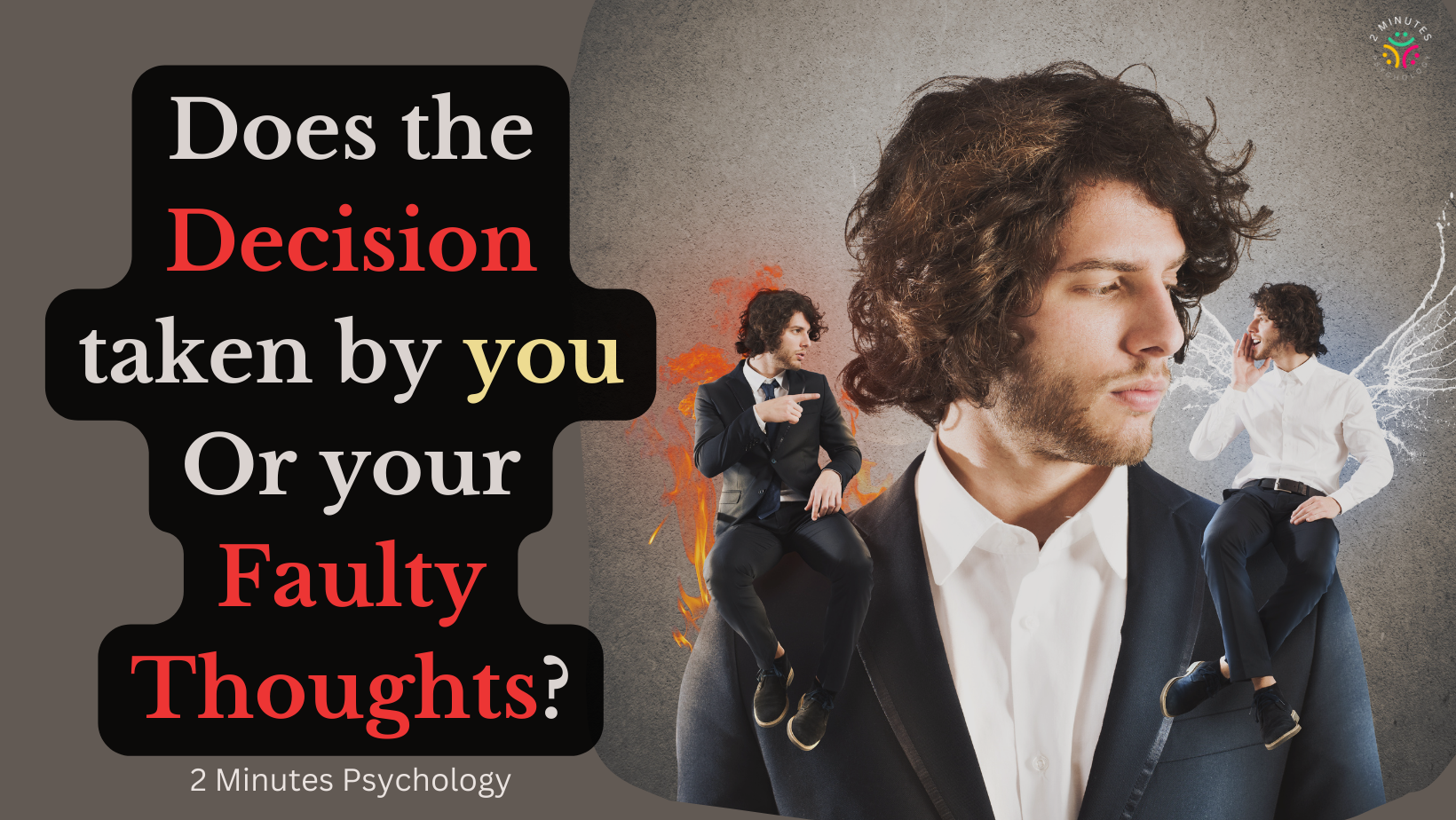
Cognitive Errors and their Impacts in Psychology

2 Minutes Psychology
Sep 10, 2025
As humans, we often rely on our intuition and experience to make decisions. However, our thinking patterns are prone to cognitive errors - biases or distortions in our thinking that affect our judgment and decision-making process. These errors can lead to faulty reasoning, poor judgments, and wrong conclusions.
In this article, we will explore the concept of cognitive errors in psychology and how they impact your decision-making process. We will delve deeper into various types of cognitive errors, such as confirmation bias, availability heuristic, and anchoring bias, and provide examples to help you understand their effects. We will also offer strategies to mitigate the impact of these biases and make more informed choices.
Key Takeaways
- Cognitive errors are biases or distortions in our thinking that can hinder effective decision-making.
- Confirmation bias, availability heuristic, and anchoring bias are common cognitive errors that can significantly influence our judgments.
- To minimize the impact of cognitive errors, we need to be self-aware, practice critical thinking, seek different perspectives, and employ logical reasoning.
Understanding Cognitive Errors
Before delving deeper into the different types of cognitive errors, it's essential to have a clear understanding of what they are. In psychology, cognitive errors refer to the systematic ways in which our judgment and decision-making processes can become flawed, leading to inaccurate conclusions or decisions.
These errors are often based on biases, assumptions, and heuristics (mental shortcuts), which can lead to distorted perceptions of reality. While cognitive errors are common, they can significantly affect our lives, from small decisions to more significant life choices.
Types of Cognitive Errors
There are various types of cognitive errors, each with its own set of characteristics and effects on our decision-making process. Some of the most common cognitive error:
Confirmation Bias
Looking for evidence that supports our pre-existing beliefs and ignoring information that contradicts them.
Availability Heuristic
Over-relying on easily accessible or memorable examples when making decisions.
Anchoring Bias
Being influenced by the first piece of information we encounter when making decisions.
Understanding these errors and how they impact our decision-making process is crucial in avoiding their pitfalls. In the following sections, we will explore each cognitive error in more depth, providing examples and techniques on how to mitigate their impact.
Confirmation bias and its impact on decision making
Confirmation bias is a cognitive error that can significantly alter one's decision-making process. It occurs when an individual seeks out or interprets information in a way that supports their pre-existing beliefs or hypotheses, while ignoring or rejecting any contradictory evidence.
This means that confirmation bias can prevent us from objectively evaluating information and forming unbiased opinions. It can lead to snap judgments, narrow-mindedness, and an inability to see alternative perspectives or solutions.
For example, imagine a hiring manager who believes that Ivy League graduates are the best candidates. Despite receiving applications from qualified candidates who did not attend Ivy League schools, the hiring manager only focuses on the Ivy League applicants and ultimately hires one of them, potentially overlooking a more qualified candidate.
To mitigate the impact of confirmation bias, individuals can try to actively seek out and consider opposing viewpoints, gather various sources of information, and remain open to changing their opinions based on new evidence. Additionally, practicing self-awareness and acknowledging one's own biases can help prevent confirmation bias from influencing decision-making processes.
The role of availability heuristic in decision making
The availability heuristic is a cognitive error where individuals make decisions based on information easily accessible in their mind. This mental shortcut can lead to biases in decision making that favor the most recent or vivid information, rather than more comprehensive and accurate data.
For example, imagine a person trying to decide whether to invest in a particular stock. They may rely on recent news headlines about the company rather than conducting thorough research on its financial performance. The availability heuristic can also occur in personal relationships, where we may base our opinions on the most memorable or emotional experiences rather than looking at the whole picture.
To overcome the impact of the availability heuristic, it is important to take a step back and consider all available information, rather than relying on what comes to mind first. It can also be helpful to seek out diverse viewpoints and perspectives to gain a more comprehensive understanding of the decision.
Join Free Virtual Chat Therapy-Let's Meet powered by 2 Minutes Psychology
Anchoring Bias and Its Influence on Decision Making
Another cognitive error that can significantly influence decision making is anchoring bias, where people rely too heavily on the first piece of information presented when making decisions. This can lead to distorted judgments and suboptimal choices.
For instance, let's say you're shopping for a new car. The salesperson tells you the price of a car is $50,000, but you think it's too expensive. However, when the salesperson shows you another car for $70,000, suddenly the original $50,000 price seems more reasonable, and you're more likely to buy it.
Anchoring bias affects many aspects of our lives, including financial decisions, career choices, and even relationships. It can be challenging to overcome, but there are strategies to minimize its impact.
To mitigate the influence of anchoring bias, it's crucial to consider multiple perspectives and sources of information. Avoid making decisions based solely on the initial information presented to you.
Additionally, taking time to evaluate different options independently and without external influences can help reduce the effects of anchoring bias. Remember that just because information is presented first doesn't mean it's the most accurate or relevant.
The impact of cognitive errors on problem-solving
Cognitive errors can seriously hinder effective problem-solving skills. When we rely on faulty reasoning, we may struggle to identify the best solutions or fail to recognize potential risks or drawbacks.
One common cognitive error that impacts problem-solving is confirmation bias. This occurs when we search for evidence that supports our existing beliefs while disregarding information that contradicts them. It can lead us to overlook alternative perspectives or creative solutions.
Another cognitive error that affects problem-solving is the anchoring bias. This occurs when we rely too heavily on the first piece of information we receive, even if it is irrelevant or misleading. It can prevent us from considering other factors or gathering additional information that could help us make a better decision.
To improve problem-solving skills and avoid these cognitive errors, it is essential to approach problems with an open mind and seek out alternative perspectives. One strategy is to seek diverse opinions and feedback from others to challenge our assumptions and biases. Additionally, it can be helpful to break down complex problems into smaller, more manageable tasks to avoid feeling overwhelmed and making rash decisions.
It is also critical to practice self-reflection and introspection to recognize and address cognitive errors when they arise. By acknowledging our biases and limitations, we can minimize their impact on our decision-making process and improve our problem-solving skills over time.
Overcoming Cognitive Errors in Decision Making
While cognitive errors can be pervasive and challenging to overcome, there are effective ways to mitigate their impact. By engaging in critical thinking, seeking diverse perspectives, and employing logical reasoning, you can make more informed decisions.
Critical Thinking
Critical thinking involves analyzing information objectively and questioning assumptions underlying your beliefs. It helps you develop a more nuanced understanding of a situation and avoid jumping to conclusions. To strengthen your critical thinking skills:
- Examine evidence carefully and evaluate its reliability.
- Consider alternative explanations for a situation.
- Identify and challenge your own biases and assumptions.
Seeking Diverse Perspectives
Seeking out different perspectives can broaden your understanding of a situation and help you make more informed decisions. This can involve:
- Talking to people with varied backgrounds and experiences.
- Reading diverse viewpoints on a topic.
- Staying open to feedback and constructive criticism.
Employing Logical Reasoning
Logical reasoning involves using reasoning and evidence to draw conclusions. It helps you avoid making decisions based on faulty assumptions or incomplete information. To employ logical reasoning:
- Identify the assumptions underlying a decision.
- Consider the evidence for and against a particular choice.
- Weigh the pros and cons of different options.
By applying critical thinking, seeking diverse perspectives, and employing logical reasoning, you can minimize the impact of cognitive errors on your decision-making process and make more informed and effective decisions.
Cognitive errors in everyday life
Cognitive errors can impact various aspects of our daily lives. Here are a few scenarios where these biases may manifest:
Cognitive errors in Personal finance
Anchoring bias may lead someone to accept a car dealer's initial price offer without negotiating, or confirmation bias may lead someone to only seek out information that supports their preferred investment strategy.
Cognitive errors in Relationships
Confirmation bias may cause someone to only notice the positive aspects of their partner, ignoring any negative behavior, or the availability heuristic may lead someone to assume that all members of a particular group have similar traits based on a few bad experiences with individuals from that group.
Cognitive errors in Career choices
Confirmation bias may cause someone to only consider career options that align with their preconceived notions of success, ignoring other opportunities that may be a better fit. The anchoring bias may cause someone to focus on their current salary when negotiating a pay raise, rather than researching industry standards or their own performance metrics.
By recognizing these biases, you can take steps to avoid them and make more informed decisions in various areas of your life.
The importance of self-awareness in combating cognitive errors
Self-awareness is the key to combating cognitive errors. The ability to recognize and acknowledge the biases affecting your decision-making process is the first step towards overcoming them. Here are some ways to cultivate self-awareness:
Introspection:
Take the time to reflect on your thoughts, feelings, and actions. Ask yourself why you think or feel a certain way, and try to identify any underlying biases or assumptions that may be affecting your judgment.
Mindfulness:
Practice being present in the moment and observing your thoughts and feelings without judgment. This can help you become more aware of your cognitive processes and notice when biases are at play.
Seeking feedback:
Ask friends, family, or colleagues for feedback on your thought processes and decision-making. This can provide an outside perspective and highlight any blind spots you may have.
The role of reflection
Reflection is an essential aspect of self-awareness. Taking the time to reflect on your decisions and their outcomes can help you identify patterns, biases, and areas for improvement. It can also help you develop a growth mindset, where you view your mistakes as opportunities for learning and growth.
"It is not that I'm so smart. But I stay with the questions much longer." - Albert Einstein
Reflection involves asking yourself questions such as:
- What were the factors that influenced my decision?
- What assumptions did I make?
- What biases may have affected my judgment?
- What could I have done differently?
By answering these questions honestly, you can gain insights into your cognitive processes and develop strategies to overcome cognitive errors.
Seeking professional help for cognitive errors
While self-awareness and the strategies discussed in this article can help mitigate the impact of cognitive errors, seeking professional help may be necessary in some cases. Psychologists and therapists are trained to identify and address cognitive biases that may be affecting your decision-making process. They can provide guidance and support to help you better understand your thought patterns and develop effective strategies for overcoming cognitive errors.
If you are struggling with cognitive errors that are impacting your personal or professional life, seeking professional help can be a valuable step towards achieving your goals and making more informed choices. Psychologists and therapists can help you learn to recognize and address cognitive biases, allowing you to approach decision-making with greater clarity and confidence. (Join Let's Meet- Free Virtual Chat Therapy)
Conclusion
Cognitive errors are a common occurrence in decision making, and they can have significant impacts on our lives. However, by understanding these errors, we can take steps to mitigate their effects and make more informed choices. Throughout this article, we explored various types of cognitive errors, including confirmation bias, availability heuristic, and anchoring bias, and discussed their influence on decision making. We also provided strategies to overcome these biases and improve problem-solving skills.
Self-awareness is a crucial element in combating cognitive errors. By reflecting on our thoughts and attitudes, we can recognize when we are falling victim to these biases and take corrective measures. Seeking professional help may also be necessary in some cases, and psychologists or therapists can provide guidance and support. Join Community to share your thoughts and get expert help- Let's Meet
Apply What You've Learned
As you go about your daily life, pay attention to situations where cognitive errors may be influencing your decisions. Try applying the techniques and strategies outlined in this article to overcome these biases. With practice, you can develop a more critical and analytical approach to decision making, and set yourself up for success in all aspects of life.
FAQ
Q: What are cognitive errors in psychology and how do they affect your decision making?
A: Cognitive errors, also known as cognitive biases, are systematic patterns of thinking that can distort our judgment and decision-making process. These errors occur due to the way our brains process information and can lead to irrational or illogical choices. Understanding cognitive errors is essential because they can significantly impact the quality of our decisions.
Q: How can I understand cognitive errors?
A: Understanding cognitive errors involves familiarizing yourself with their different types and how they manifest in real-life situations. By learning about confirmation bias, availability heuristic, and anchoring bias, among others, you can recognize these errors when they occur and take steps to mitigate their effects.
Q: What is confirmation bias and how does it impact decision making?
A: Confirmation bias is the tendency to seek and interpret information in a way that confirms our existing beliefs or biases, while disregarding evidence that contradicts them. This bias can lead to distorted decision making as it narrows our perspective and limits our ability to consider alternative viewpoints or objectively evaluate information.
Q: How does the availability heuristic influence decision making?
A: The availability heuristic is a cognitive shortcut where we rely on immediate examples or instances that come to mind easily when making judgments or decisions. This bias can lead to inaccurate assessments as we may give more weight to information that is readily available, while ignoring or underestimating less accessible or less memorable data.
Q: What is anchoring bias and how does it influence decision making?
A: Anchoring bias refers to the tendency to rely heavily on the first piece of information encountered when making decisions, even if it may be irrelevant or arbitrary. This bias can lead to insufficient adjustment or overreliance on initial data, resulting in biased judgments and decisions.
Q: How do cognitive errors affect problem-solving?
A: Cognitive errors can hamper effective problem-solving by introducing biases and limiting our ability to think critically and objectively. These errors can lead to faulty reasoning, flawed decision-making, and hinder our problem-solving skills. Recognizing and avoiding common cognitive pitfalls can enhance our problem-solving capabilities.
Q: How can I overcome cognitive errors in decision making?
A: Overcoming cognitive errors involves developing critical thinking skills, seeking different perspectives, and employing logical reasoning. By consciously challenging our biases, questioning assumptions, and considering alternative viewpoints, we can reduce the impact of cognitive errors on our decision making.
Q: In what ways do cognitive errors manifest in everyday life?
A: Cognitive errors can manifest in various aspects of our everyday lives, such as personal finance, relationships, and career choices. These biases can impact our financial decisions, lead to misunderstandings or conflicts in relationships, and affect our career choices. Being aware of these biases can help us make more informed choices in these areas.
Q: How does self-awareness combat cognitive errors?
A: Self-awareness plays a crucial role in combating cognitive errors. By engaging in introspection, practicing mindfulness, and reflecting on our thoughts and behaviors, we can become more aware of our biases. This awareness allows us to recognize when we're falling into cognitive pitfalls and take steps to address and mitigate their impact.
Q: When should I seek professional help for cognitive errors?
A: In some cases, seeking professional help from psychologists or therapists may be necessary to effectively address cognitive errors. These professionals can provide guidance, support, and specialized techniques to help individuals overcome deep-seated biases and improve their decision-making abilities. If cognitive errors are significantly impacting your life, seeking professional help is a viable option.
Community
Share your experience
Let's Meet 2 Minutes Psychology
Aug 28
Remember
Let's Meet 2 Minutes Psychology
Aug 28
Cognitive Behavioral Therapy (CBT) and anxiety coping skills
Let's Meet 2 Minutes Psychology
Aug 28
Anxiety coping skills for teens
Let's Meet 2 Minutes Psychology
Aug 28
Grounding techniques
Let's Meet 2 Minutes Psychology
Aug 28
.png)

